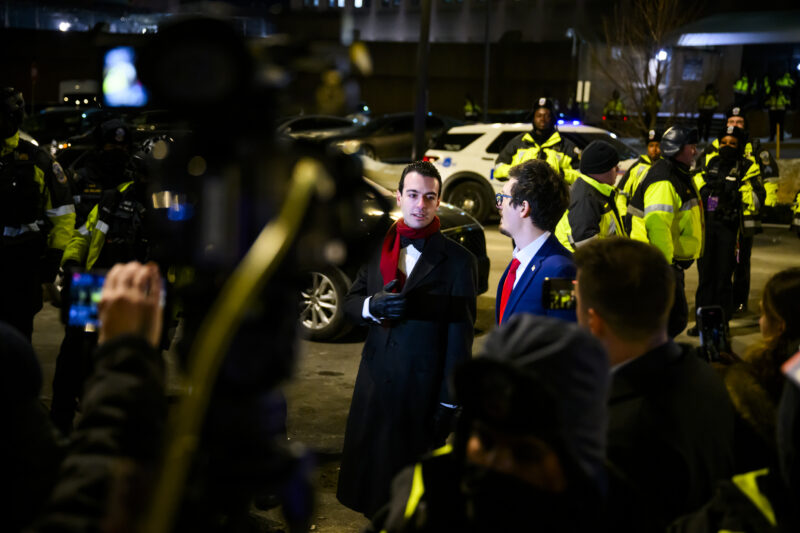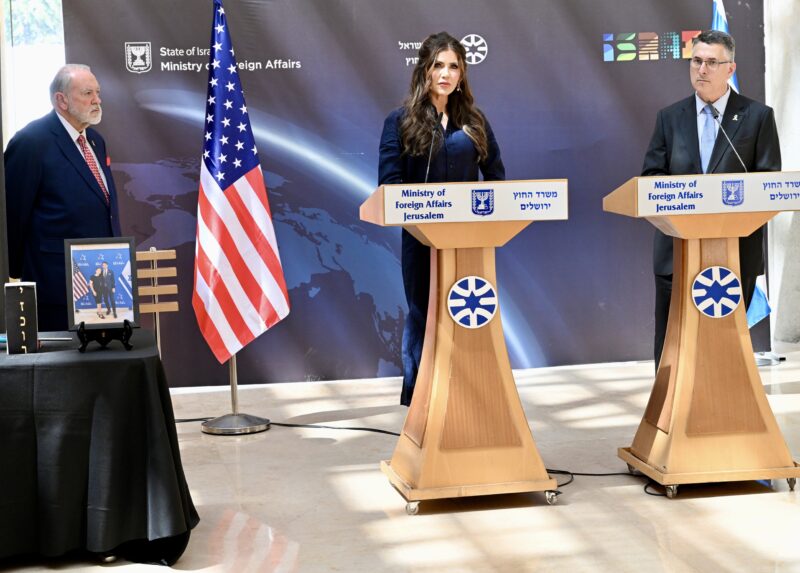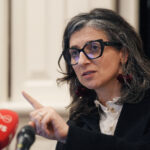But the former governor’s recent outreach to skeptics could win him some late-breaking endorsements in the race’s final weeks

Spencer Platt/Getty Images
Former New York Gov. Andrew Cuomo speaks at the West Side Institutional Synagogue on April 1, 2025, in New York City.
In recent weeks, as Andrew Cuomo has stepped up his outreach to Orthodox Jewish leaders across New York City who represent sizable voting blocs crucial to his mayoral bid, he has found himself involved in an effort that is no doubt unfamiliar to the famously hard-nosed former New York governor: an apology tour.
Even as Cuomo has been outspoken in his support for Israel and opposition to rising antisemitism that he has called “the most important issue” in the race, he has continued to face lingering resentment from Orthodox voters who remain bitter over restrictions he implemented amid the COVID pandemic, which many community members recall as discriminatory.
The Cuomo campaign appears to have recognized that it could no longer avoid such tensions with just over a month until the June 24 Democratic primary, despite holding a sizable lead in the crowded race to unseat embattled Mayor Eric Adams, who is now running as an independent.
In ongoing listening sessions with a wide range of Orthodox leaders to whom he holds long-standing ties, Cuomo has sought to mend relationships that deteriorated over his crackdown on religious gatherings at the height of the pandemic, for which he first publicly voiced regret in recent comments to a local Jewish publication that in some ways laid the groundwork for his subsequent private meetings.
“I’m sure, in retrospect, I could have done some things differently and not every move is ever perfect in hindsight,” Cuomo acknowledged in an interview late last month with VIN News, which caters largely to Orthodox community members in New York City. “When some Orthodox communities had very high rates [of COVID-19], we were compelled to take action,” he added, “which created the impression that the community was targeted, although it was driven by the data that we had.”
In reflecting on what he called “the dark days of COVID,” he said his administration “absolutely could have done more to meet with and talk to community leaders and rabbis about what we were doing to ensure there was a two-way dialogue and that their concerns were addressed,” emphasizing he “would never want anyone to feel mistreated in any way.”
The former governor has reiterated some version of that explanation in recent sit-downs with Orthodox leaders whose coveted endorsements can hold sway in communities across the five boroughs, according to people familiar with the discussions. The outreach has been largely coordinated by Chris Coffey, a veteran Democratic strategist who is informally advising the Cuomo campaign and previously led Andrew Yang’s mayoral bid.
Recent interviews with Orthodox leaders, most of whom asked to remain anonymous to speak freely about a sensitive issue, suggest that they have been receptive to his efforts to make amends and express some contrition about his handling of the pandemic, even as they stressed feeling that he could have gone further in his comments.
“The leaders are listening to him,” said an Orthodox activist who is tracking Cuomo’s outreach but is not involved in the primary. “The problem is the people on the ground.”
Even one Hasidic activist who said he had helped to polish Cuomo’s statement before it was shared with VIN News admitted that the former governor “could have done more to show remorse” in his response to the community.
Still, the activist, who recently met with Cuomo and is part of a sizable and politically influential Hasidic community in the Williamsburg section of Brooklyn whose leaders can traditionally help deliver thousands of votes, said the former governor is now likely to win its endorsement. The eventual nod, he added, will still require some persuasion among the younger rank and file resentful of the so-called “red zones” Cuomo set in place during COVID — pointing to a generational divide that community leaders will almost certainly need to address.
“The leaders are listening to him,” said an Orthodox activist who is tracking Cuomo’s outreach but is not involved in the primary. “The problem is the people on the ground.”
Despite the bitter feelings, most Orthodox leaders believe constituents will back Cuomo once they are made aware of the current state of the race, which has consistently shown Zohran Mamdani, a Queens state assemblyman and fierce critic of Israel, firmly in second place, far outpacing other candidates who hold more established ties to the Jewish community — including the city comptroller, Brad Lander, and Adrienne Adams, the speaker of the City Council.
For his part, Mamdani, an outspoken member of the Democratic Socialists of America who has endorsed boycotts of Israel, has engaged in some outreach to the Orthodox community — though his efforts have been met with derision by most leaders who regard his campaign as a threat to their interests. The state lawmaker, for instance, has recently faced backlash for declining to sign on to a resolution last week that had recognized the 77th anniversary of Israel’s founding — not long after he had kept his name off of a separate resolution in Albany that condemned the Holocaust.
“He sort of apologized,” Leon Goldenberg, an Orthodox businessman who serves as an executive board chair of the Flatbush Jewish Community Coalition, said with a chuckle. “But we’ll make it acceptable, what can I tell you? We don’t have any choices. That’s really the bottom line,” he told JI, referring to Mamdani, whose positions on Israel and other issues he called “antisemitic.”
“I think the leadership sees the writing on the wall in the race and the alternatives,” said an Orthodox community activist supportive of Cuomo, summing up the stakes of the race. “I don’t want to undersell how bad the last few months were despite the solid relationship going back several decades,” he said of Cuomo’s time in office, which ended in 2021 when he was forced to resign amid accusations of sexual misconduct that the former governor continues to deny.
“He’s privately spent the last few months building confidence in those damaged relationships,” the activist explained. “I think the leadership is there, but they want to convey to constituents the dynamics of the primary and get them on board.”
Leon Goldenberg, an Orthodox businessman who serves as an executive board chair of the Flatbush Jewish Community Coalition, told JI his group met with Cuomo last Monday for what he described as a productive conversation in which he had pushed the former governor to speak about his COVID policies.
“He sort of apologized,” Goldenberg said with a chuckle. “But we’ll make it acceptable, what can I tell you? We don’t have any choices. That’s really the bottom line,” he told JI, referring to Mamdani, whose positions on Israel and other issues he called “antisemitic.”
By contrast, Goldenberg added, Cuomo “has been terrific on Israel and terrific on antisemitism,” which the former governor has highlighted among his top priorities in the race. “At the end of the day, he has done a lot of good things for the state and has been a competent manager,” he reasoned. “Has he made mistakes? Yes. That’s really what it is. He will make mistakes. But hopefully it won’t be on the Orthodox community’s back.”
Echoing others who spoke with JI, Goldenberg said he expected that Orthodox leaders would eventually fall in line behind Cuomo as the primary draws to a close in the coming weeks. “Everybody is accepting and everybody is going to be on board with him,” he said, noting that he and his board chairs would soon be engaging in outreach to constituents as part of an effort to clarify their choices in the looming election.
While a recent poll showed Cuomo with just 26% among Jewish voters in the primary, he still led the field by a wide margin — underscoring his favorable position in the race as he seeks to regain trust from the Orthodox community.
The Cuomo campaign, for its part, is hoping that Orthodox voters will ultimately view the race as a “binary choice” between the former governor and Mamdani, a source familiar with the matter told JI.
His recent outreach will likely help crystallize that decision, say Orthodox leaders who have met with him. In one meeting, for instance, Cuomo vowed to hire a senior Orthodox Jewish liaison if he is elected mayor, to maintain lines of communication with his office and avoid potential future conflicts, according to a person familiar with the pledge.
“On COVID, the red zones were driven by the data we had, but as the governor previously said, on reflection we absolutely could have done more to communicate with community leaders and rabbis about what we were doing to ensure that concerns were addressed,” Rich Azzopardi, a Cuomo campaign spokesperson told JI.
Last Monday, meanwhile, Cuomo even “used the phrase ‘I apologize” while meeting with a coalition of Orthodox leaders organized by Agudath Israel of America, which had sued Cuomo in federal court for his COVID restrictions, said an attendee. “He didn’t say what for,” the attendee told JI. “But those words came out.”
“People felt, policy-wise, he’s much more in tune with them than the other candidates, but they felt singled out and stigmatized” over his approach to COVID, the attendee told JI, noting that the meeting had gone smoothly. “People wanted to hear some sort of contrition, some acknowledgment of what happened.”
In a statement to JI on Sunday, Rich Azzopardi, a Cuomo campaign spokesperson, said the former governor “has deep and decades-long relationships with the Jewish community and appreciates the frank dialog.”
“On COVID, the red zones were driven by the data we had, but as the governor previously said, on reflection we absolutely could have done more to communicate with community leaders and rabbis about what we were doing to ensure that concerns were addressed,” Azzopardi continued.
He said Cuomo would fight rising antisemitism by “strengthening our laws, ensuring that violations of the human rights law are prosecuted to the fullest extent possible and making sure our schools adopt a curriculum that takes antisemitism and other forms of bias seriously.”
The former governor is expected to hold additional meetings with Orthodox leaders this week in heavily Jewish neighborhoods of Brooklyn such as Borough Park and Crown Heights, according to sources with knowledge of his outreach.
Hank Sheinkopf, a veteran Democratic strategist in New York City, said Orthodox community members who are still skeptical of Cuomo are misreading the moment as Mamdani gains traction in the final leg of the race.
“The polling data shows that Mamdani is on the move,” he told JI. “The Jewish community really doesn’t have much choice here.”







































